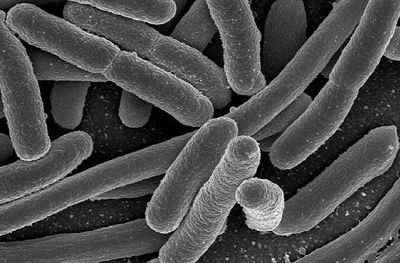The New Microbiome Frontier: Johnson & Johnson Teams With Biotech Startup To Find Bacteria-Based Ulcerative Colitis Treatment

Scientists have had the human genome decoded for close to a decade now, but the pursuit of understanding the complex symbiotic environment inside of each person is still underway. We have evolved for generations in a close relationship with beneficial bacteria that inhabit our bodies, transferring them from generation to generation. Yet, with increased use of antibiotics in the last century, we have disturbed a delicate balance. Many researchers feel that this may be contributing to the rise in diseases such as ulcerative colitis and Crohn's disease.
Humans have around 10 trillion cells, and then 100 trillion bacteria inside the digestive tract, totaling over 2 lbs. These helpful bacteria, which aid in digesting food and crowding out pathogenic bacteria such as C. diff and Salmonella, are vital for proper human health.
Large pharmaceutical companies are taking notice of the importance that these symbiotic bacteria play in maintaining proper health, and now Jansen Pharma, a division of Johnson & Johnson, has formed a collaboration with a small biotechnology company that specializes in developing ways to modify the human microbiome to treat ulcerative colitis.
"Foundational microbiome research over the past several years has demonstrated that alterations to the microbiome are central to the development of inflammation and metabolic disorders," said Peter DiLaura, President and CEO at Second Genome. "The role of the microbiome in health and disease has arrived as a significant area of focus in pharmaceutical R&D. This collaboration with Janssen will identify mechanisms by which microbial populations in the gut have an impact in ulcerative colitis."
The small biotechnology company, Second Genome, is named for the so-called 'second genome' that people carry around in their 100 trillion bacteria. Scientists at academic institutions are slowly learning that the content and types of bacteria in the digestive system can influence everything from allergies to autoimmune diseases and can even help ward off other harmful bacteria that cause infections.
"A breakdown in the normal relationship between the human immune system and the bacterial communities that reside in the gut appears to play an important role in development of the hallmark chronic inflammation of ulcerative colitis," said Dr. Susan Lynch, Ph.D., scientific advisor to Second Genome and Director of the Colitis and Crohn's Disease Microbiome Research Core. "Second Genome has a powerful platform to mine the microbiome for potential targets which have the potential to translate into effective therapeutics that dramatically impact patient health."
The startup is currently focused on drug discovery that will alter the content of the microbiome in humans that could result in treatments for ulcerative colitis. The company is casting a wide net, looking at small molecule pharmaceuticals, peptide biologics (pieces of proteins), and other bacteria that can affect the interaction of bacteria with other bacteria and between gut bacteria and humans.
A technique known as a fecal transplant, where a healthy person's stool is transplanted into a person with an illness, such as C. diff infection, has been proven to have curative powers. Researchers believe that the initial infection occurs because healthy bacteria are killed off and cannot crowd out harmful ones. Many lines of study are pursuing the understanding of why this works, and whether a specific bacteria, cocktail of bacteria, or bacterial-produced chemicals can help in cases of infection.
Second Genome is currently pursuing three pre-clinical pipeline programs and looking into other treatment routes as well.
The company released data in November that showed C. diff growth and toxin production could be stopped with extracts from normal fecal material, showing that it was not only the helpful bacteria crowding out C. diff on a regular basis, but also chemicals that the beneficial bacteria made that blocked C. diff. "Recent interest in fecal transplants demonstrate how reestablishing the microbiome can prevent and cure infections such as C. diff, however little is known about the function of the microbial populations in those fecal transplants that impact overall human health," said Todd DeSantis, co-founder and head of bioinformatics at Second Genome and an author of the study. "Our efforts to profile changes in the gut microbiome are helping us understand the function that certain bacterial species and their byproducts have on resistance to C. difficile and informs drug discovery programs."
The company has also put resources toward strengthening the link between the microbiome and the development of type 2 diabetes.
Published by Medicaldaily.com



























